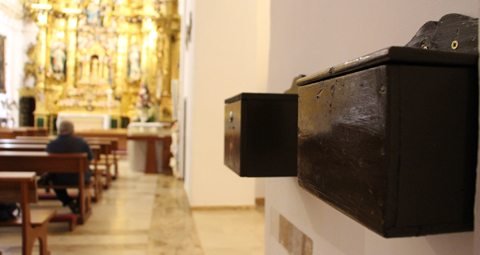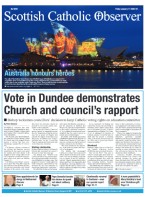BY Daniel Harkins | July 20 | ![]() 0 COMMENTS
0 COMMENTS ![]() print
print

Just how much does a priest earn?
THE BOW IN THE HEAVENS looks at an often shrouded aspect of priestly life: the parish finances
When I celebrated my big birthday recently, I didn’t fully realise just how much interest Saga would be taking in my life (what remains of it): they are like the best pen-pals ever.
While I mull over the installation of the walk-in bath, those nice folk at Saga are also asking me to consider my post-retirement income. To be honest, I’ve thought of little else of late.
Last Sunday’s Gospel didn’t help, if I’m honest. Jesus prepares the Twelve for their mission with the injunction ‘take no coppers for your purses.’ It doesn’t look as though ministry and sound financial planning go hand in hand.
It goes without saying that nobody becomes a priest for personal gain. Although I have never met a priest who was poor -in any real sense of the word-most priests do live lives of genteel poverty. We are a bit like landed gentry who have fallen on hard times: still rattling around in their ancestral piles, which are far too big for their current occupants, and the damp-draining dehumidifiers are given a run for their money.
That said, there is a veil of secrecy and, just occasionally, inequality around priestly finances. Distasteful as it may be to speak of money, that tainted thing, I intend to dispel some of the myth and mystery attached to ‘what Father earns.’
For a start, diocesan priests do not take a vow of poverty. Although a sober and moderate lifestyle is enjoined upon clergy by Canon Law and the frequent exhortations of the Holy Father, a priest’s dosh is his own.
Those who have ‘come from money’ or have earned it in secular employment are under no obligation to part with it, no matter how the bishop or the diocesan treasurer might beat their bongos in jubilation at the very thought of doing so.
In most cases, however, priests derive their income from their parish. Priests in Scotland receive a salary of just under £3,000 per annum. Although the policy regarding the purchase, maintenance and running of cars differs from diocese to diocese (in my diocese, the car is a private expense), a further £2,000 is available to help with petrol for ‘work mileage.’ So, that’s about £5,000 a year. I know that, in some parishes where finances are stretched, priests don’t always take their full allowance and I know that some clergy beyond the state pension age choose to live off that instead.
If you add in the provision of the house, heat, light and food, then you arrive at a perfectly reasonable standard of living.
Beyond that, the inequalities I mentioned above begin to feature. A parish priest is allowed to keep one Mass stipend per day, although he must celebrate a Sunday Mass for the intentions of the people.
That means, therefore, that his ‘income’ from that source, if I may use such a term, will often depend on the size of his parish and the size of the Mass offering itself. A Mass offering, or stipend, was originally meant to be a token of thanks and support from the person requesting the Mass to the priest offering it. It may originally have been the ingredients of a meal-a chicken, say-before hard cash obscured that part of the relationship between pastor and faithful.
Here in St Joseph’s, there is no shortage of Mass intentions to be offered, although one day I may be offered £2 for my daily sustenance and ten times that the next. There are, however, small parishes in this and other dioceses where Mass intentions are rarely requested, and the financial support of stipends need to be sought from elsewhere. It is not unusual to pass on Mass intentions and the accompanying stipends to priests in neighbouring parishes, never mind foreign missionaries.
In many parishes, additional Masses are celebrated during the month of the Holy Souls in November and any Mass offerings enclosed in the November lists can either form part of an individual priest’s stipendiary income or, like the others mentioned above, be shared at deanery or diocesan level.
The final source of income is what is sometimes referred to as ‘stole fees.’ This is a bit of a misnomer, since the word ‘fees’ implies a tariff and, if there is a Catholic parish which actually has a list of fees, then I must plead ignorance and apologise for it.
Most-but not all of the times-when a priest performs a Baptism, marriage or a funeral, it is common to offer him a ‘wee thank you.’ This ‘bung’ is what the accountants refer to as a ‘stole fee.’ Now there is wild variation in what that offering may be. It is a little galling, I must say, when the church (or, let’s face it, the priest) is given a sum roughly equivalent to less than one per cent of what is being spent on the rest of a wedding or a post-Baptism party. Priorities and all that.
It’s not unheard of, however, to be offered precisely nothing as a token of gratitude. While that may be a sign of a good Catholic distaste for simony (the ‘goods’ of the Church are never for sale), I suspect it’s often nothing of the sort.
I still refer to such instances of envelopes missing in action as ‘Queen’s Parkers.’ This dates back to my tender years as a priest, when we were often two, three or even four to a parish.
Any offerings from a Baptism, wedding or funeral would go into a shared kitty called the Carbona or Korbona (perhaps a corrupted form of the Greek word for temple treasury, korbanas). The kitty would be divided a few times a year between the priests of the parish, especially at summer holiday time and Christmas.
As you were all benefiting from it, it was incumbent on each priest to be seen to contribute to it. I had one parish priest who would occasionally stroll in on a Sunday after a Baptism (sometimes several) and declare to the brethren, ‘That was a Queen’s Parker, lads.’
This was a reference to the eponymous Glasgow football club, still, I think, the only fully amateur outfit in the The Scottish Professional Football League: in other words, they ‘play for nothing.’ The Korbona would be getting nothing that day. I soon adopted the expression for my own instances of returning empty-handed from the sanctuary. Even to this day, when I have no confrères to break the news to, I still make a little mental declaration, ‘A Queen’s Parker there, JB.’
I hope that no noses are being put out of joint by this foray into finances: don’t get me wrong, most priests are far from being rapacious or avaricious.
Priests can tell if someone is genuinely poor and would never think of expecting anything beyond a word of thanks from those who are struggling to make ends meet. And yet the thing I have observed consistently in my years a priest is that those who have least are always the most generous: the parable of the widow’s mite is played out in parishes across the land.
As I said, I hope you won’t ‘tut tut’ over this foray into this usually shrouded aspect of priestly life. It’s not just that we’re having a slow news week here in the Bow, but I thought I would devote one of my final columns to addressing a topic which does have a direct impact on the lives of our priests and our parishes.
And yes, you did read correctly: I’ve decided it’s time to step aside and let other voices be heard in the pages of this august paper. I’m quite sure the editor will have lots of good ideas up his sleeve for when the Bow in the Heavens disappears (as all rainbows must)-in fact, if you’ll excuse the pun, you can bank on it!










